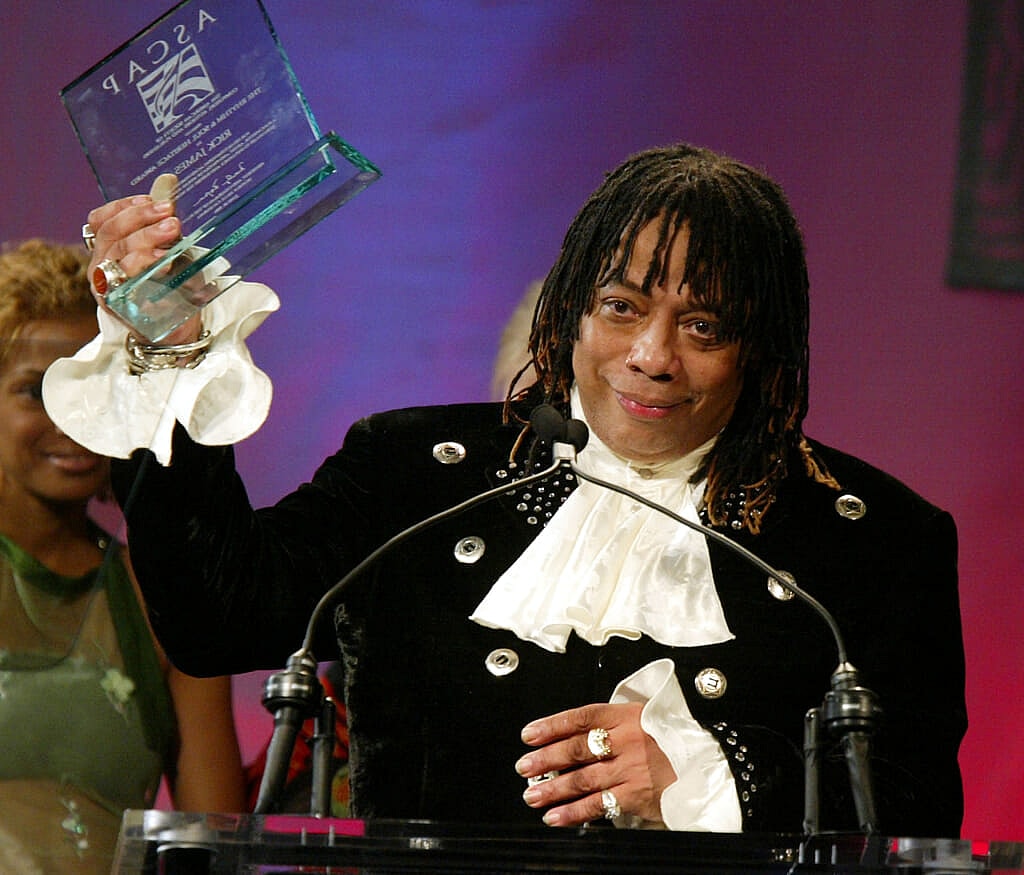Whenever the name Rick James is spoken, some may snicker with laughter, some may sneer with disgust, and others will smile with nostalgia. A new documentary about the late platinum-selling singer/songwriter will have you feeling everything about him.
Bitchin: The Sound and Fury of Rick James is the definitive documentation of a talented artist and complex, tortured man. It is not a farce like “Charlie Murphy’s True Hollywood Stories” sketch on Chappelle’s Show, it’s not the glorification of his excessive lifestyle that Tales From The Tour Bus was, and it’s not an E! TV exposé on his abusive exploits that landed him into Folsom Prison.
What director Sasha Jenkins accomplished was to paint a portrait of a man who was affected by his single parent upbringing in a racist Buffalo, New York who went on to live in Canada, hanging out with Joni Mitchell and playing music with Neil Young, serve time in the Brig for going AWOL from the Navy, make hits with Motown Records and emerge as an in-demand producer and singer.
Jenkins does a definitive job explaining James’ rationale and approach to the innovation of punk funk music. Hits like “You and I,” “Mary Jane” and “Bustin’ Out” are amalgamations of James’ influences, from Louis Jordan and Thelonious Monk, to George Clinton and Sly Stone and even Kiss, in terms of presentation and exploiting mischief during performances.
READ MORE: Rick James limited series ‘Super Freak’ in development

Something that James said about his brand of Punk Funk was that playing or singing a wrong note was a good thing, as long as it felt good, felt natural. With commentary from James’ band mates, like outspoken keyboardist Levi Ruffin, we get a clear look inside at the work ethic, arrogance and ultimate success of James’ approach to music.
His platinum-selling run of albums at Motown Records yielded a string of R&B hits, and the choice to have Universal Motown’s VP of A&R Harry Weinger break down the stems and individuals tracks from songs like “You and I,” “Mary Janes,” “Give It To Me Baby,” and “Super Freak,” give a validity to James genius as a producer, songwriter and arranger.
Bitchin really puts funk music on a pedestal, making sure the viewer recognizes that it stands shoulder to shoulder with genres like jazz, rock and roll and soul. Norwood Fisher of Fishbone summed it up best:
“Funk is a modern interpretation of our ancestors screaming through us from Africa, through the pain of slavery, through Jim Crow. It’s Black excellences and it’s some n-gga sh-t. The worst made beautiful, given an opportunity to express.”
Jenkins, director of the Emmy-nominated Wu Tang Clan documentary Of Mics and Men, is able to make the connection between James’ dangerous brand of funk from the 1970s and 1980s, and the grizzly, infectious rap music happening today, thanks to interviews with acts like Ice Cube and Conway the Machine. With the latter, he was able to show one of the most glaring influences on James’ music and persona, his home city of Buffalo.

READ MORE: A$AP Rocky documentary ‘Stockholm Syndrome’ tells rapper’s side of Sweden imprisonment
Something interesting that the film uncovers is James’ strange dichotomy of his view towards women. On one hand, he was a possessive, abusive, disposable attitude towards them in his life off-stage, exemplified by a story of his bass player having a sex with a woman while James begins to video tape them and spank her with a belt.
On the other hand, James was able to recognize his volatile behavior to women and attempt, by his own admission, to reconcile it by making them prominent fixtures in his music, treating female artists with respect in the studio and propelling them with opportunity to stand on their own feet in the industry. He accomplished this with both the Mary Jane Girls and Teena Marie.
Bitchin: The Sound and Fury of Rick James is an amazing depiction of James as a man. Not a sympathetic figure, nor a villain, but a man.
A man affected deeply by his harsh surroundings of his upbringing, the eclectic music he absorbed throughout his youth and the demons that manifested in his personal life and his music during his adult life. It shows what happens when the such demons are used in a superstar’s music; they eventually turn you into your own worst enemy.
Ultimately, what this films shows is that we as consumers continue to be drawn to the darkness, lack of inhibition and excitement that James’ catalog so brilliantly has provided.
Have you subscribed to theGrio’s new podcast “Dear Culture”? Download our newest episodes now!
TheGrio is now on Apple TV, Amazon Fire, and Roku. Download theGrio today!

